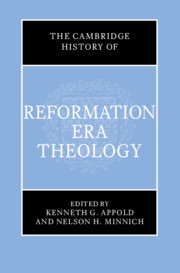Book contents
- The Cambridge History of Reformation-Era Theology
- The Cambridge History of Reformation-Era Theology
- Copyright page
- Contents
- Figures
- Acknowledgments
- Contributors
- Abbreviations
- Introduction
- Part One Theology in an Age of Cultural Transformation
- Part Two Schools and Emerging Cultures of Theology: Diversity and Conformity within Confessions
- 10 The Faculty of Theology of Paris (1474–1682)
- 11 The School of Salamanca
- 12 The Schools of Louvain and Douai: The Bible, Augustine, and Thomas
- 13 The Jesuit School of Theology
- 14 Theological Currents in Latin America (Sixteenth Century)
- 15 Diversity and Conformity within Early Lutheranism
- 16 Reformed Schools of Theology
- 17 Cultures of Theology in the British Isles
- 18 Radical and Dissenting Groups
- 19 Christian Ecumenical Efforts
- 20 Western “Confessions” and Eastern Christianity
- Part Three Topics and Disciplines of Theology
- Index
- References
18 - Radical and Dissenting Groups
from Part Two - Schools and Emerging Cultures of Theology: Diversity and Conformity within Confessions
Published online by Cambridge University Press: 27 September 2023
- The Cambridge History of Reformation-Era Theology
- The Cambridge History of Reformation-Era Theology
- Copyright page
- Contents
- Figures
- Acknowledgments
- Contributors
- Abbreviations
- Introduction
- Part One Theology in an Age of Cultural Transformation
- Part Two Schools and Emerging Cultures of Theology: Diversity and Conformity within Confessions
- 10 The Faculty of Theology of Paris (1474–1682)
- 11 The School of Salamanca
- 12 The Schools of Louvain and Douai: The Bible, Augustine, and Thomas
- 13 The Jesuit School of Theology
- 14 Theological Currents in Latin America (Sixteenth Century)
- 15 Diversity and Conformity within Early Lutheranism
- 16 Reformed Schools of Theology
- 17 Cultures of Theology in the British Isles
- 18 Radical and Dissenting Groups
- 19 Christian Ecumenical Efforts
- 20 Western “Confessions” and Eastern Christianity
- Part Three Topics and Disciplines of Theology
- Index
- References
Summary
Faced with the challenge of defending the orthodoxy of the Evangelical Reformation against attacks from the Catholic Church, the early Reformers tended to regard all other competing groups as an undifferentiated threat, generally under the heading of Schwärmerei (fanatics). In their eyes these movements were dangerously subjective and seditious – a threat to both the Reformation cause and to good public order. Thus, in his 1528 tract Von der Widertauffe Martin Luther described his opponents as “wild-eyed fanatics,” bent on destroying godly order in church and society. Two years later Luther’s colleague Philip Melanchthon depicted them as “angels of the devil” whose only interest was to sow seeds of confusion and division.
- Type
- Chapter
- Information
- The Cambridge History of Reformation Era Theology , pp. 345 - 371Publisher: Cambridge University PressPrint publication year: 2023

